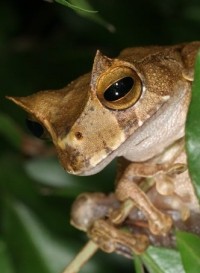 Species name: Gastrotheca cornuta
Species name: Gastrotheca cornuta
Common name: Horned Marsupial Frog
Red List status: Endangered (https://www.iucnredlist.org/species/55329/11294031)
Distribution: Costa Rica, Panama, Colombia, and Ecuador
Habitat: Gasthrotheca cornuta is found mainly in lowland and premontane humid primary and secondary forests lacking disturbance however, there are reports of this species being found in oil palm plantations.
Threats to survival: Habitat loss, disease.
Species assessment by AArk: Costa Rica: Ark role – A species that is extinct in the wild (locally or globally) or which could become completely extinct without ex situ management.
Panama: – Rescue/Supplementation – A species that is in imminent danger of extinction (locally or globally) and requires ex situ management, as part of an integrated program, to ensure its survival / A species for which ex situ management benefits the wild population through breeding for release as part of the recommended conservation action.
 Reproductive behaviour: This species of marsupial frog reproduces by direct development with no free-swimming tadpole stage. Eggs are fertilized externally and carried in a pouch on the back of the female. After 60-80 days, fully formed frogs emerge. Note: the eggs are the largest of any amphibian species.
Reproductive behaviour: This species of marsupial frog reproduces by direct development with no free-swimming tadpole stage. Eggs are fertilized externally and carried in a pouch on the back of the female. After 60-80 days, fully formed frogs emerge. Note: the eggs are the largest of any amphibian species.
Interesting natural history notes: See Reproductive behavior.
In situ projects currently underway: None at the moment.
Ex situ programs: Small ex situ populations exist at the El Valle Amphibian Conservation Center (EVACC, www.houstonzoo.org/meet-the-animals/amphibians/) in El Valle de Anton, Panama and also at the Atlanta Botanical Garden (www.atlantabotanicalgarden.org), Atlanta, Georgia, USA.
How can we help this species? While reproduced several times in captivity in and outside of Panama, the captive born generations suffer from health problems associated with nutrition and husbandry. Supporting further research on amphibian dietary and husbandry research surely would be helpful to this species.







